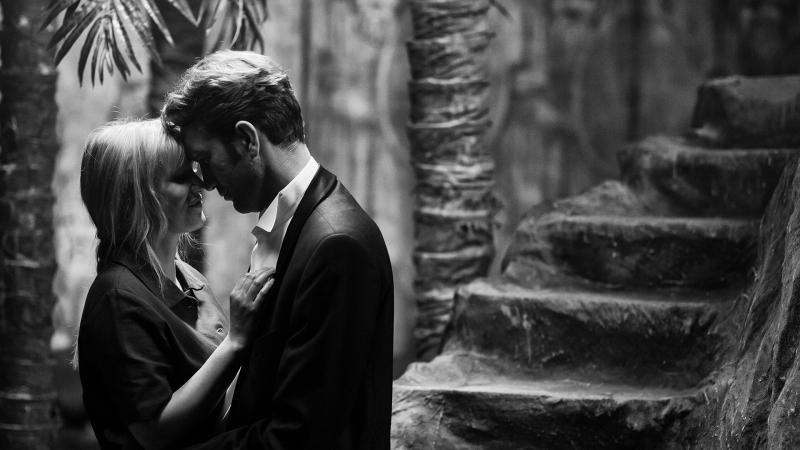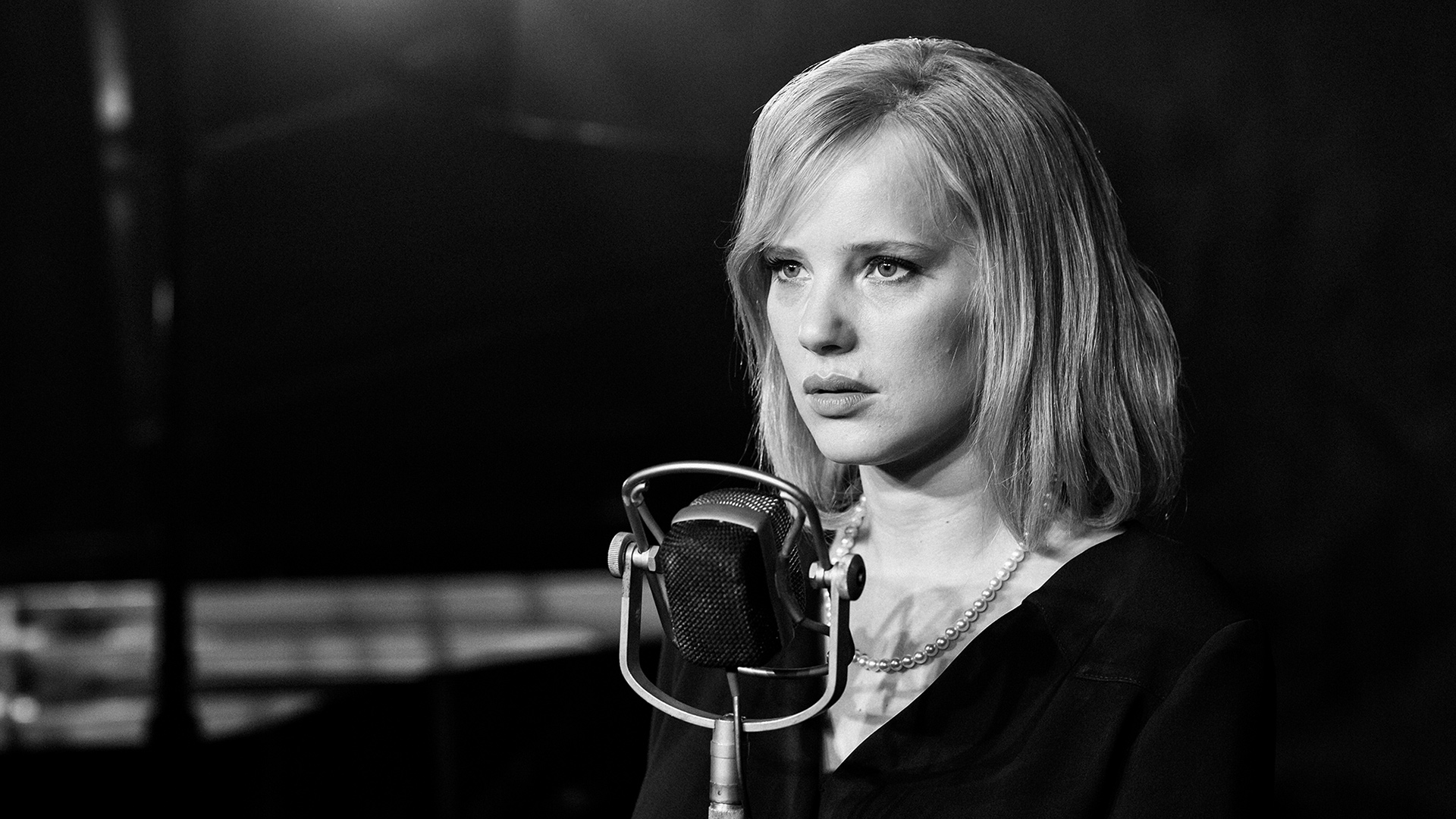Cold War review - a gorgeous and mesmerising romance | reviews, news & interviews
Cold War review - a gorgeous and mesmerising romance
Cold War review - a gorgeous and mesmerising romance
Pawel Pawlikowski honours the spirit of his parents' turbulent romance

Can we ever really know the passion that brought our parents together? By the time we are old enough to hear the story of how they first met, that lovers’ narrative has frayed in the telling and faded in the daily light of domestic familiarity.
It’s 1949 and Wiktor (Tomasz Kot) is a musical director in his thirties who has been despatched to the remote corners of wintry Poland to record local performers. His brief is to assemble a touring troupe of folk singers acceptable to Party officials. Tricked out in winsome peasant costumes, the troupe will perform traditional Polish ballads and new paeans to socialist values. Among the bagpipe players and keening old ladies who come to audition, Zula (Joanna Kulig) stands out. She’s barely 17 but her fiery determination to get on has already led her to stab her father when he made a pass at her. Soon, she and Wiktor have embarked on a passionate but stormy affair that will see them travelling around Poland and onto Germany and Yugoslavia.  Pared down to 89 minutes, Cold War follows not just the lovers as they cross paths over 15 years but also portrays the icy control that Moscow in its heyday exerted throughout the Soviet Union. Party officials and apparatchiks pull the strings and while Zula is no Eliza Doolittle, she becomes a propaganda-singing doll. There are compromises and betrayals, reinventions and recriminations on a grand scale; these two can’t live with each other but can’t live apart either. Wiktor sees a chance to break free from churning out Stalinist kitsch and slips through the Iron Curtain. Once in Paris, he is drawn into jazz clubs and composes music for a nouvelle vague film director.
Pared down to 89 minutes, Cold War follows not just the lovers as they cross paths over 15 years but also portrays the icy control that Moscow in its heyday exerted throughout the Soviet Union. Party officials and apparatchiks pull the strings and while Zula is no Eliza Doolittle, she becomes a propaganda-singing doll. There are compromises and betrayals, reinventions and recriminations on a grand scale; these two can’t live with each other but can’t live apart either. Wiktor sees a chance to break free from churning out Stalinist kitsch and slips through the Iron Curtain. Once in Paris, he is drawn into jazz clubs and composes music for a nouvelle vague film director.
Pawlikowski and the late screenwriter Janusz Głowacki don’t always make it easy to keep up with the story. It’s refreshing to see a period film that trusts the audience’s ability to work out what’s happening without history being spelled out in crude signposts. The script jumps ahead in time and on to new locations. Cold War jettisons characters with no warning - the excellent Agata Kulesza, brilliant as the acerbic Stalinist aunt in Ida, disappears too soon from the film. Key characters and love rivals are thrown into the narrative without introduction - a charismatic French film director played by real-life director Cédric Kahn, Jeanne Balabar as a Parisian poet inspiring Zula to jealous rage. Much use is made of ellipses in the editing by Jaroslav Kaminski and sometimes one feels as if a vital scene or two has been left on the cutting-room floor. There’s perhaps too much of the lovers’ fighting and not enough of the creative intimacy that brought them together. And while Joanna Kulig burns up the screen as Zula, it’s harder to see what she finds so irresistible in the more cipher-like Wiktor as played by Tomasz Kot.
Cold War is punctuated throughout with breaks where the screen goes black and we are left in the dark, listening to the audio track alone - be it music or sound effects - signalling a new chapter. Pawlikowski sticks with the classic 4:3 Academy ratio which served him so well in Ida, and again uses incandescent monochrome to capture the past. Lukasż Zal’s superb cinematography means that all one wants is to steal a print of the film, cut out every frame and blow up each image to perform a forensic examination of its beauty. But that would be to lose Pawlikowksi’s intricate sound design, the energy of the performances and the kaleidoscope of music (Chopin, Bach, bebop and Bill Haley all have their moment). When the film came to an end, all I wanted was to watch it all over again; Cold War is the first really great film of 2018.
rating
Explore topics
Share this article
The future of Arts Journalism
You can stop theartsdesk.com closing!
We urgently need financing to survive. Our fundraising drive has thus far raised £49,000 but we need to reach £100,000 or we will be forced to close. Please contribute here: https://gofund.me/c3f6033d
And if you can forward this information to anyone who might assist, we’d be grateful.

Subscribe to theartsdesk.com
Thank you for continuing to read our work on theartsdesk.com. For unlimited access to every article in its entirety, including our archive of more than 15,000 pieces, we're asking for £5 per month or £40 per year. We feel it's a very good deal, and hope you do too.
To take a subscription now simply click here.
And if you're looking for that extra gift for a friend or family member, why not treat them to a theartsdesk.com gift subscription?
more Film
 Urchin review - superb homeless drama
Frank Dillane gives a star-making turn in Harris Dickinson’s impressive directorial debut
Urchin review - superb homeless drama
Frank Dillane gives a star-making turn in Harris Dickinson’s impressive directorial debut
 Mr Blake at Your Service review - John Malkovich in unlikely role as an English butler
Weird comedy directed by novelist Gilles Legardinier
Mr Blake at Your Service review - John Malkovich in unlikely role as an English butler
Weird comedy directed by novelist Gilles Legardinier
 Don't Let's Go to the Dogs Tonight review - vivid adaptation of a memoir about a Rhodesian childhood
Embeth Davidtz delivers an impressive directing debut and an exceptional child star
Don't Let's Go to the Dogs Tonight review - vivid adaptation of a memoir about a Rhodesian childhood
Embeth Davidtz delivers an impressive directing debut and an exceptional child star
 One Battle After Another review - Paul Thomas Anderson satirises America's culture wars
Leonardo DiCaprio, Teyana Taylor, and Sean Penn star in a rollercoasting political thriller
One Battle After Another review - Paul Thomas Anderson satirises America's culture wars
Leonardo DiCaprio, Teyana Taylor, and Sean Penn star in a rollercoasting political thriller
 Steve review - educator in crisis
Cillian Murphy excels as a troubled headmaster working with delinquent boys
Steve review - educator in crisis
Cillian Murphy excels as a troubled headmaster working with delinquent boys
 Can I get a Witness? review - time to die before you get old
Ann Marie Fleming directs Sandra Oh in dystopian fantasy that fails to ignite
Can I get a Witness? review - time to die before you get old
Ann Marie Fleming directs Sandra Oh in dystopian fantasy that fails to ignite
 Happyend review - the kids are never alright
In this futuristic blackboard jungle everything is a bit too manicured
Happyend review - the kids are never alright
In this futuristic blackboard jungle everything is a bit too manicured
 Robert Redford (1936-2025)
The star was more admired within the screen trade than by the critics
Robert Redford (1936-2025)
The star was more admired within the screen trade than by the critics
 Blu-ray: The Sons of Great Bear
DEFA's first 'Red Western': a revisionist take on colonial expansion
Blu-ray: The Sons of Great Bear
DEFA's first 'Red Western': a revisionist take on colonial expansion
 Spinal Tap II: The End Continues review - comedy rock band fails to revive past glories
Belated satirical sequel runs out of gas
Spinal Tap II: The End Continues review - comedy rock band fails to revive past glories
Belated satirical sequel runs out of gas

Add comment